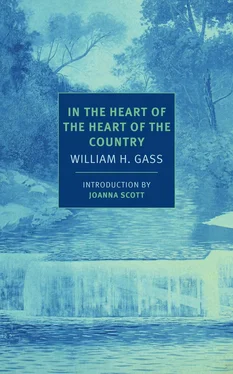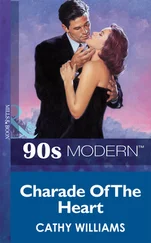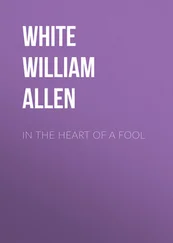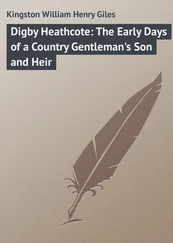It was an experience from which I have not yet recovered. I go back each evening just when dusk is falling and stand by the redbud tree at the back of Mrs. Cramm’s yard. I never see her, yet I know that on the evenings when the Wallaces visit with the Means, she talks to the children. I have lain like fog between the garages and only heard whispers — vague, tantalizing murmurs. Every evening I hope the streetlights will surprise her again. I know where every streak will be. I think I have seen her in the back seat of the Means’ car when it is parked in the barn sometimes — a blank patch of stone gray. Is it Ames who slips out to meet her? Recently, while I’ve been loitering at the end of the alley, taking my last look around, I’ve felt I’ve mixed up all my starts and endings, that the future is over and the past has just begun. I await each evening with growing excitement. My stomach turns and turns. I am terribly and recklessly impelled to force an entrance to their lives, the lives of all of them; even, although this is absurd, to go into the fabric of their days, to mote their air with my eyes and move with their pulse and share their feeling; to be the clothes that lie against their skins, to shift with them, absorb their smells. Oh I know the thought is awful, yet I do not care. To have her anger bite and burn inside me, to have his brute lust rise in me at the sight of her sagging, tumbling breasts, to meet her flesh and his in mine or have the sores of Mr. Wallace break my skin or the raw hoot of his wife crawl out my throat… I do not care… I do not care. The desire is as strong as any I have ever had: to see, to feel, to know, and to possess! Shut in my room as I so often am now with my wife’s eyes fastened to the other side of the door like blemishes in the wood, I try to analyze my feelings. I lay them out one by one like fortune’s cards or clothes for journeying and when I see them clearly then I know the time is only days before I shall squeeze through the back screen of the Means’ house and be inside.
I
It had snowed heavily during the night, but by morning the sky had cleared, deepening the frost. The sun when it rose was dazzling, and at once it began to melt the roofs and window edges, power lines and limbs of trees. Icicles formed rapidly. At first they were thick and opaque like frozen slush, but later, lengthening, they cleared and began to glitter brilliantly like pieces of heavy glass. When Fender left his house he had to duck, sweeping a number away with his arm, they were that long already, and there were more when he returned at five — a row had formed above his picture window. Multiply like weeds, he thought, kicking fragments from his stoop with the side of his foot. Later he sat in his living room eating a pot pie from a tray in his lap and chewing crackers, his gaze passing idly along the streets in the wheel ruts and leaping the disorderly heaps of shoveling. He was vaguely aware of the ice that had curtained a quarter of his window, and of the light from the streetlamps reflected by it, but he was thinking how difficult it was to sell property so suspiciously hidden. This time of year the wind blew over the porches of the houses he was showing. His prospects were invariably shivering before he got them in. He’d say it was no day to trade caves, or some such thing, and they’d nod in a determined way that made him realize they meant it. A faint smile might drift to their faces. Inside there were boots and rubbers and the mess of snow and papers, sellers like shabby furniture, their wan and solemn children staring large-eyed at the strangers, while in-laws, made fat, no doubt, by their wisdom, held their arms like bundles to their chests and stopped up the doorways. There was always frost on the windows, darkening the rooms, and the attics and basements and enclosed porches were cold and grim, and his prospects had stiff, inhuman faces.
Prospects: a pickly word, a sour betrayer. It was supposed to fill your thoughts with gold, or with clear air and great and lovely distances. Well, the metal came quickly enough to mind, but beards followed shortly, dirt and the deceptions of the desert, biscuits like powdered pumice, tin spoons, stinking mules, clattering cups, stinking water, deceiving air.
You’ve got to watch their eyes, Glick. Watch their eyes. Then at the first sign (here Fender would bang his hands together) close in. Greed. (He’d hug himself.) Greed’s what you want to see — all the worst, Glick — envy, that possessive eye. Bang! That eagerness. That need.
But he had a list of numbers to call. He’d better get at it.
He hated winter. The same gray sky lay on the ground, day after day, gray as industrial smoke, and in the sky the ground floated like a street that’s been salted, and his closets were cold, holes wore through his pockets, and he was lonely, indoors and out, with a loneliness like the loneliness of overshoes or someone else’s cough. At the office you seldom got out; your hours weren’t your own; you figured insurance and read the ads in the papers and called when people were home. At the other desk, stacking brochures that advertised lots in Florida and sucking on his fountain pen, rearranging flowers that were dead and dialing numbers without lifting the receiver, was Glick — Glick, the wiseman, Glick, the joker — green all winter like a pine… all winter. There was no one else to talk to but Isabelle, and of course Isabelle…
Glick, why do you do that? I mean, why do you dial like that, with the receiver on the hook? Glick leans over his desk, placing both hands on the phone like a healer. I rehearse the number I’m going to call. He’s very serious, very intense. I rehearse everything. He says it proudly. Preparation is the secret of success.
Advice. From the start. Very wise. And Glick was the younger man. Glick. A pickle. A pickly fellow. Fender’s fork poked through the crust of his pie, releasing steam, and he squinted at the crawling, winking snow. No friend of his. Who knew what shape the lawns were in?
Fender allowed his first bite to fall back. Still staring aimlessly, he rinsed his mouth with air and sent it coasting against the pane. Another advantage of living alone. No embarrassment. Only sensible. He stirred the pie with his fork. If he touched his tongue to the window — that would be cooling. Undeniably another advantage. Who would dare to… publicly? Even alone he felt constraint. As if Pearson might be passing and would see him apply such a kiss to the glass. To Pearson it would look strange and Pearson would hold the strangeness against him.
Again there was no beef to speak of. Deftly he exposed a piece. Lights pierced the pie as about them the gravy darkly oozed and bubbled. The pies were best when the company was still trying to make a good impression. There would be lots of meat then, and the crust would be tender. Pies, he thought, pies…
He wondered whether he ought to try another kind, maybe the kind with the cow on the label. He believed the cow was smiling and he tried to imagine its face and its figure clearly but shards of ice in the drifts disturbed him. There were sales, times of year the price subsided, others again when it rose; there was a rhythm in the market as regular as though it were moved by the moon. He was supposed to keep his ear to the ground and hear the new supermarket opening or the branch bank or the store, the block of offices going up, the factory closing….
Fortunate if you had a freezer.
Pearson, this morning, had once again whacked Fender’s desk with his newspaper. Suddenly: whackwhack. Keep your ears to the ground, Fender. Listen. Listen with all you’ve got, with the whole business — hard — with your eyes, with your nose — with the soul, Fender — yes, that’s what I mean, that’s it — the soul. So keep those ears down. That’s how we get on in this business. That’s how, I should say, you get on, hay, fair friend? But look — I mean Isabelle, Glick — look: there Fender sits. He sits. Where’s your spirit, Fender, your sporting spirit? Merry up. Oh… sad. He’s a sad old dog, Glick. Sad old dog. Try to match me, Fender. Here — take on a real master. Get your blood up. Ah, but look: he sits. Poor pooch. I say, Isabelle — poor pooch. Come on, Fender, try to top the old pro just once and really harken , fair friend, hay? — really listen in. Think if you heard as much as I do. A din! Now then, are you ready, wound and set? Okay — okay — what’s happening — here’s a nice one for you — what’s happening at sixteen thirty-two, oh let’s make it, um, ah — Balinese?
Читать дальше












